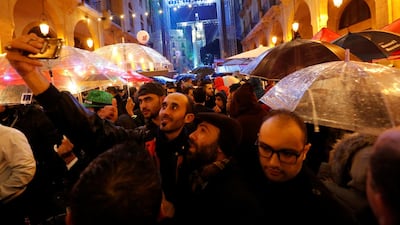Last month, Forbes, the American business magazine famous for ranking the richest people on the planet, published its Best Countries for Business report for 2018. Not surprisingly, the UAE came top in the Mena region, while little old Lebanon, a country that for millennia has been a historical byword for trading, came a poor tenth out of the 14 regional nations surveyed, only outranking Egypt, Algeria, Yemen and Libya. And if we're being honest, I'm quite surprised we beat Egypt.
It's a far cry from the days when Beirut was the Arab capital, with the Arab currency and, in Intrabank, the biggest financial institution in the Middle East, with offices in the US, all the major European capitals, Brazil, the Bahamas and West Africa. Its assets included chunks of real estate in New York, where it owned a 27-storey office building on 5th avenue, and Paris. It also owned a major French shipyard, as well as Middle East Airlines, Lebanon's national carrier. Today, our top player is Banque Audi, which comes in at number 18 in the list of Arab banks.
With the Forbes list came the depressingly familiar health check: 1 per cent growth, GDP per capita of $7,900, and, most gloomy of all, a reminder that the population is now estimated to be 6.2 million, up nearly 50 per cent (no one knows the exact figure) in seven years, the equivalent of around 36 million Europeans flooding into the UK over the same period.
Still, in the overall global ranking, we did manage to pip Iran, another country in economic and political turmoil and one where the world recently witnessed a series of nationwide protests, the second to hit the country in ten years. Initially inspired by economic grievances, the violence eventually morphed into expressions of unvarnished and outright discontent with a regime that has ruled unbendingly for nearly four decades. Things have since calmed down, but the fault lines are there.
Part of the anger from Iran’s sizeable young population is the funding of what the protestors have called “foreign militias” – the Houthis in Yemen, Hamas in Gaza and in Lebanon, instead of using such money ($100 billion of which was apparently “unfrozen” in the wake of the 2015 nuclear deal) to tackle pressing domestic concerns such as food shortages and unemployment.
Of all Iran’s foreign legions, Hizbollah is the jewel in the crown, a political party that, to its grass root Shia constituents, is as Lebanese as a Cedar tree, but whose armed wing – more an army – is nothing more than an adjunct of Iran’s revolutionary guard, there to do Tehran’s regional bidding.
_____________
Read more:
Lebanon needs to offer more in return for foreign investments
Few signs of economic progress during Lebanon's 'year of the ostrich'
Lebanon on the edge of an economic abyss
_____________
But in Lebanon, a nation happier making deals than causing mayhem and conflict on behalf of a foreign patron, Hizbollah’s domination of local politics, a position it has achieved through the veiled threat of violence, has understandably deadened the economic climate. No wonder no one wants to do business in Lebanon; not only does nothing work, the guys in charge are stronger than the regular army.
Meanwhile, Hizbollah has overcome such economic setbacks either by receiving large financial handouts from Iran, or, according to the US Treasury, by engaging in money laundering and drug trafficking, activities that have placed the whole Lebanese banking sector, the backbone of what is left of the economy, under global scrutiny.
Lebanon, due to its unique confessional make-up, is caught in a vice between Iran, a country that has shown that it has not evolved much since the overthrow of the Shah in 1979, and the relatively progressive, increasingly outward looking and ultimately prosperity-driven GCC nations, most notably the UAE and Saudi Arabia, which, under the youthful stewardship of Crown Prince Mohammed bin Salman, has shown it is genuinely willing to embrace reform.
And yet events in Iran have shown that there may be a glimmer of hope for both the Iranians and Lebanon. The “dogma at the expense of progress” doctrine that has driven Iran since Ayatollah Khomeini picked up the revolutionary slack may be reaching its sell-by date, and as far as we can see the rulers have nothing left in their pack bag to replace it.
A new generation of Iranians want to belong to a connected global society, while a new generation of Lebanese, who have grown up in a sunnier place, one outside the sad sectarian shadow of civil war, have dramatically different views than those espoused by their parents’ generation. They all just want to work for Microsoft and Google.
As I pointed out in November, in the wake of the since-rescinded resignation of Prime Minister Saad Hariri, once this particular brand of Iranian influence in Lebanon wanes and Hezbollah’s influence is reduced to that of any other political party, then we might have progress.
Let's conclude with a spot of good news. A friend has told me that the Chinese embassy in Beirut is expanding its compound and bringing with it extra security. The word on the street is that the world's biggest manufacturing nation and the second biggest economy is positioning itself for a post-war Syria and the hope is that Lebanon will be cross-pollinated by all this exciting activity. Who knows? We may even improve our Forbes ranking.

